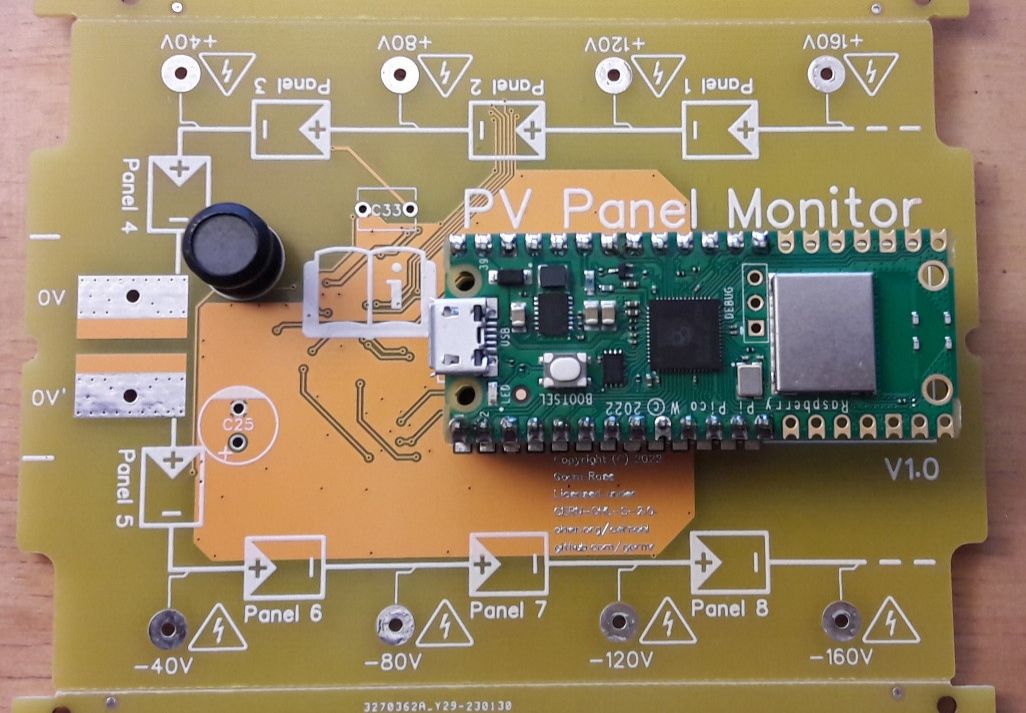 Ongoing
OngoingRP2040_PV_Panel_Monitor
STDRP2040_PV_Panel_Monitor
License
:CERN Open Hardware License
Description
# RP2040-based Photovoltaic Panel Monitor
# Safety Warning
This project deals with high DCs voltages. Make sure you understand what you are doing. Please read the safety warning below carefully.
# This PCB can monitor the volages and current of up to 8 PV cells with up to 50V each.
Please see https://github.com/GormR/PV_Supervisor for details.
CERN Open Hardware Licence Version 2 - Strongly Reciprocal
--------------------------------------------------------------------------------
# Test code for PV Panel Monitor
#
# copyright 2023 by Gorm Rose
#
# This example code is licensed under GNU PL V3.0
# GP0: MuxSel1
# GP1: MuxSel0
# GP2: Temperature (DS18B20U)
# GP26: AIO0 voltage of "negative" PV modules
# GP27: AIO1 voltage of "positive" PV modules
# GP28: AIO2 common current
# Vref = external
from machine import Pin, I2C, ADC
#from ssd1306 import SSD1306_I2C
from time import sleep
#### µC pin definitions ####
MuxSel1 = Pin(0, Pin.OUT) # select1 for all multiplexers
MuxSel0 = Pin(1, Pin.OUT) # select0 (LSB) for all multiplexers
LED = Pin(3, Pin.OUT) # LED (high = on)
ADCn = ADC(26)
ADCp = ADC(27)
ADCc = ADC(28)
#### user constants ####
factor1 = 3 * (1 * 470 + 24) / (0x10000 * 24) # 3 volt reference, 16 bit, divider 470/24
factor2 = 3 * (2 * 470 + 24) / (0x10000 * 24) # 3 volt reference, 16 bit, divider 940/24
factor3 = 3 * (3 * 470 + 24) / (0x10000 * 24) # ...
factor4 = 3 * (4 * 470 + 24) / (0x10000 * 24)
factor5 = 3 * 1000 * 2 / (0x10000 * (470 + 2))
#### variables ####
# neg _ pos
# P1 P2 P3 P4 P5 P6 P7 P8
Vpv = [0, 0, 0, 0, 0, 0, 0, 0]
Ppv = [0, 0, 0, 0, 0, 0, 0, 0]
Ipv = 0
def set_mux(channel):
if (channel & 2) == 0:
MuxSel1.value(0)
else:
MuxSel1.value(1)
if (channel & 1) == 0:
MuxSel0.value(0)
else:
MuxSel0.value(1)
def read_value(channel, number_of_samples):
global Vpv, Ppv, Ipv
rawVoltNeg = 0
rawVoltPos = 0
rawCurrent = 0
set_mux(channel)
sleep(0.001)
for i in range (0, number_of_samples):
rawVoltNeg += ADCn.read_u16()
rawVoltPos += ADCp.read_u16()
rawCurrent += ADCc.read_u16()
Ipv = factor5 * rawCurrent / number_of_samples
if channel == 0:
Vpv[0] = factor4 * (0x10000 - rawVoltNeg / number_of_samples) - Vpv[1] - 3
Vpv[4] = factor1 * rawVoltPos / number_of_samples
Ppv[0] = Ipv * Vpv[0]
Ppv[4] = Ipv * Vpv[4]
if channel == 1:
Vpv[1] = factor3 * (0x10000 - rawVoltNeg / number_of_samples) - Vpv[2] - 3
Vpv[5] = factor2 * rawVoltPos / number_of_samples
Ppv[1] = Ipv * Vpv[1]
Ppv[5] = Ipv * Vpv[5]
if channel == 2:
Vpv[2] = factor2 * (0x10000 - rawVoltNeg / number_of_samples) - Vpv[3] - 3
Vpv[6] = factor3 * rawVoltPos / number_of_samples
Ppv[2] = Ipv * Vpv[2]
Ppv[6] = Ipv * Vpv[6]
if channel == 3:
Vpv[3] = factor1 * (0x10000 - rawVoltNeg / number_of_samples) - 3
Vpv[7] = factor4 * rawVoltPos / number_of_samples
Ppv[3] = Ipv * Vpv[3]
Ppv[7] = Ipv * Vpv[7]
print("Hello Solar World!")
for i in range(0, 1000):
for j in range(0, 4):
read_value(j, 1000)
print("voltages: ", Vpv)
print("current: ", Ipv)
print("resulting power: ", Ppv)
print()
Design Drawing
 The preview image was not generated, please save it again in the editor.
The preview image was not generated, please save it again in the editor.BOM
 Bom empty
Bom empty Clone
CloneProject Members
 Empty
Empty


Comment